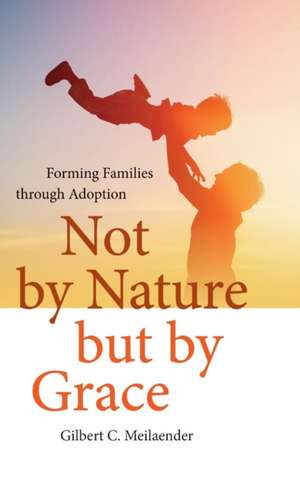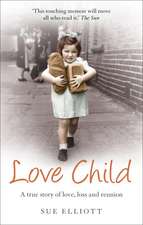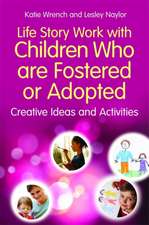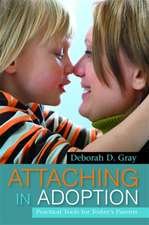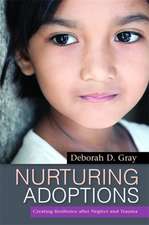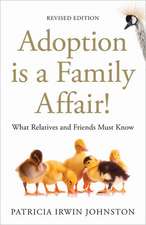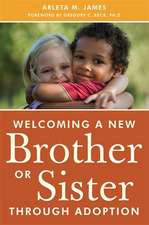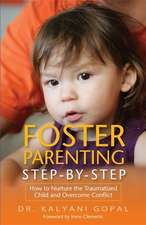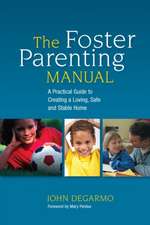Not by Nature but by Grace – Forming Families through Adoption: Catholic Ideas for a Secular World
Autor Gilbert C. Meilaenderen Limba Engleză Hardback – 14 sep 2016
Working from within the contours of Christian faith, this book examines the relation between two ways of forming families—through nature (by procreation) and through history (by adoption). Christians honor the biological tie between parents and children, for it is the work of God in creation. Yet Christians cannot forget that it is adoption, and not simply natural descent, that is at the center of the New Testament’s depiction of God’s grace. Gilbert Meilaender takes up a range of issues raised by the practice of adoption, always seeking to do justice to both nature and history in the formation of families, while keeping at the center of our vision the truth that it is not by nature but by grace that we can become adopted children of the one whom Jesus called his Father.
Meilaender begins with reflection on the puzzling relation of nature and history in forming families and proceeds to unpack the meaning of huiothesia, the word used in the New Testament to name the grace by which a follower of Jesus becomes an adopted child of God. That perspective is applied to a range of questions that regularly arise in Christian theological discussions of adoption: Is adoption only for the infertile? Should single persons adopt? Is it wise for adoption to take place across racial or national boundaries? Special attention is paid to the relation between adoption and new reproductive technologies and to what is called “embryo adoption.” Interspersed between the chapters are letters written by the author to his own son by adoption. But if the argument of the book is taken seriously, these letters are written not to one who falls within a special category of “adopted son or daughter,” but to one who is, simply and entirely, a son or daughter.
"Gilbert Meilaender writes as a Christian, and he finds help in sorting through his perspective from Muslim and Jewish sources. His tone is patient (even when discussing arguments he finds wrongheaded) pulling out the best and the worst strands in questions regarding adoption, ART, and cryopreserved embryos. The chapters are informative and winsomely written. He has also notably managed to bring books I read to my daughters together with arcane theological documents that are relevant, but tricky to introduce." —Amy Laura Hall, Duke Divinity School
"One of the great theological ethicists of our generation, Gil Meilaender has gifted us with a book that is absolutely essential reading for anyone whose life is touched by adoption and wants to make moral sense of it. Meilander’s pithy, lucid style is perfect for conveying deep theological truths, and his arguments are consistently compelling and civil. Having lived a life with adopted children, Meilaender shows us deep and abiding wisdom on every page." —John Berkman, Regis College, University of Toronto
"Readers of Meilaender’s work have come to expect beautiful prose wedded to probing theological and ethical analysis. Both are in evidence in this engaging exploration of how adoption challenges Christians to understand the complex balancing of nature and history that is required for a proper understanding of family life. That Meilaender can weave together literature, philosophy, theology, and personal experience so seamlessly in developing his account of adoption is a marvel." —Paul Lauritzen, John Carroll University
Meilaender begins with reflection on the puzzling relation of nature and history in forming families and proceeds to unpack the meaning of huiothesia, the word used in the New Testament to name the grace by which a follower of Jesus becomes an adopted child of God. That perspective is applied to a range of questions that regularly arise in Christian theological discussions of adoption: Is adoption only for the infertile? Should single persons adopt? Is it wise for adoption to take place across racial or national boundaries? Special attention is paid to the relation between adoption and new reproductive technologies and to what is called “embryo adoption.” Interspersed between the chapters are letters written by the author to his own son by adoption. But if the argument of the book is taken seriously, these letters are written not to one who falls within a special category of “adopted son or daughter,” but to one who is, simply and entirely, a son or daughter.
"Gilbert Meilaender writes as a Christian, and he finds help in sorting through his perspective from Muslim and Jewish sources. His tone is patient (even when discussing arguments he finds wrongheaded) pulling out the best and the worst strands in questions regarding adoption, ART, and cryopreserved embryos. The chapters are informative and winsomely written. He has also notably managed to bring books I read to my daughters together with arcane theological documents that are relevant, but tricky to introduce." —Amy Laura Hall, Duke Divinity School
"One of the great theological ethicists of our generation, Gil Meilaender has gifted us with a book that is absolutely essential reading for anyone whose life is touched by adoption and wants to make moral sense of it. Meilander’s pithy, lucid style is perfect for conveying deep theological truths, and his arguments are consistently compelling and civil. Having lived a life with adopted children, Meilaender shows us deep and abiding wisdom on every page." —John Berkman, Regis College, University of Toronto
"Readers of Meilaender’s work have come to expect beautiful prose wedded to probing theological and ethical analysis. Both are in evidence in this engaging exploration of how adoption challenges Christians to understand the complex balancing of nature and history that is required for a proper understanding of family life. That Meilaender can weave together literature, philosophy, theology, and personal experience so seamlessly in developing his account of adoption is a marvel." —Paul Lauritzen, John Carroll University
Preț: 132.00 lei
Nou
Puncte Express: 198
Preț estimativ în valută:
25.26€ • 26.21$ • 21.11£
25.26€ • 26.21$ • 21.11£
Carte disponibilă
Livrare economică 22 februarie-08 martie
Preluare comenzi: 021 569.72.76
Specificații
ISBN-13: 9780268100681
ISBN-10: 0268100683
Pagini: 136
Dimensiuni: 178 x 231 x 14 mm
Greutate: 0.3 kg
Ediția:1
Editura: MR – University of Notre Dame Press
Seria Catholic Ideas for a Secular World
ISBN-10: 0268100683
Pagini: 136
Dimensiuni: 178 x 231 x 14 mm
Greutate: 0.3 kg
Ediția:1
Editura: MR – University of Notre Dame Press
Seria Catholic Ideas for a Secular World
Recenzii
"One of the great theological ethicists of our generation, Gil Meilaender has gifted us with a book that is absolutely essential reading for anyone whose life is touched by adoption and wants to make moral sense of it. Meilander’s pithy, lucid style is perfect for conveying deep theological truths, and his arguments are consistently compelling and civil. Having lived a life with adopted children, Meilaender shows us deep and abiding wisdom on every page." —John Berkman, Regis College, University of Toronto
"Readers of Meilaender’s work have come to expect beautiful prose wedded to probing theological and ethical analysis. Both are in evidence in this engaging exploration of how adoption challenges Christians to understand the complex balancing of nature and history that is required for a proper understanding of family life. That Meilaender can weave together literature, philosophy, theology, and personal experience so seamlessly in developing his account of adoption is a marvel." —Paul Lauritzen, John Carroll University
"Gilbert Meilaender writes as a Christian, and he finds help in sorting through his perspective from Muslim and Jewish sources. His tone is patient (even when discussing arguments he finds wrongheaded), pulling out the best and the worst strands in questions regarding adoption, artificial reproductive technologies, and cryopreserved embryos. The chapters are informative and winsomely written. He has also notably managed to bring books I read to my daughters together with arcane theological documents that are relevant, but tricky to introduce." —Amy Laura Hall, Duke Divinity School
“As Meilaender points out, current estimates are that, worldwide, 17–18 million children are orphans. . . . Meilaender’s fine and accessible book is an important start in thinking about forming families and the implications of our commitment to them.” —Christian Century
“Meilaender analyzes ethical questions that bear on us all, and not merely adoptive parents, because the question of adoption also raises the question of what it means to be human.” —Lutheran Quarterly
Notă biografică
Gilbert C. Meilaender is senior research professor at Valparaiso University and Paul Ramsey Fellow at the Notre Dame Center for Ethics and Culture. His books include Meditations on Christ's Words from the Cross, Should We Live Forever?: The Ethical Ambiguities of Aging, and Neither Beast Nor God: The Dignity of the Human Person.
Extras
EXCERPT:
"This little study takes adoption as its focus. I do this, first of all, simply because adoption raises for us questions of great practical importance. But it is also true that directing our atten- tion to adoption is a way of bringing into focus the problem of relating nature and history within Christian faith. Consequently, the chapters that follow may seem, I grant, to be a rather idiosyncratic discussion of adoption. Although I try to pay attention to many of the issues that are regularly part of adoption discussions (especially in chapter 3), the center of my concern is the meaning of adoption for Christian theology. That may help to explain why I devote two chapters to thinking about how best to relate adoption to technologies of assisted reproduction and to what has come to be called embryo adoption. The heart of the matter is that adoption is a work not of nature but of grace." —from the introduction, Not by Nature but by Grace: Forming Families through Adoption by Gilbert C. Meilaender
"This little study takes adoption as its focus. I do this, first of all, simply because adoption raises for us questions of great practical importance. But it is also true that directing our atten- tion to adoption is a way of bringing into focus the problem of relating nature and history within Christian faith. Consequently, the chapters that follow may seem, I grant, to be a rather idiosyncratic discussion of adoption. Although I try to pay attention to many of the issues that are regularly part of adoption discussions (especially in chapter 3), the center of my concern is the meaning of adoption for Christian theology. That may help to explain why I devote two chapters to thinking about how best to relate adoption to technologies of assisted reproduction and to what has come to be called embryo adoption. The heart of the matter is that adoption is a work not of nature but of grace." —from the introduction, Not by Nature but by Grace: Forming Families through Adoption by Gilbert C. Meilaender
Descriere
Not by Nature but by Grace: Forming Families through Adoption is the first volume in the new Catholic Ideas for a Secular World series. As a theologian, Gilbert Meilaender writes from within the contours of Christian faith and examines the relation between two ways of forming families—through nature (by procreation) and through history (by adoption).
